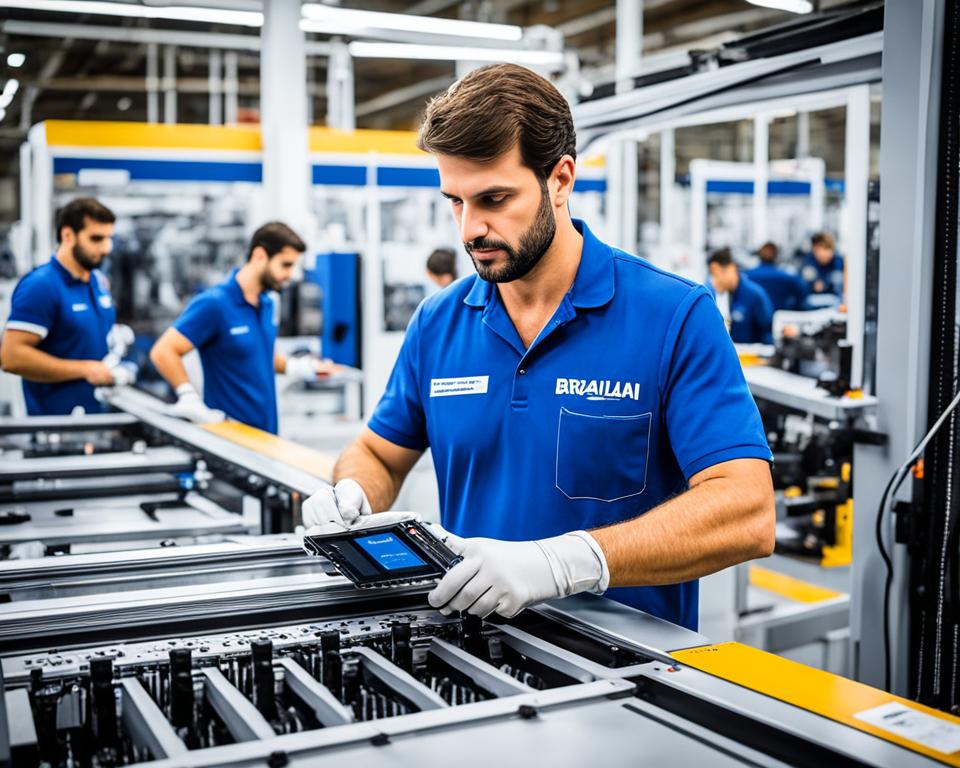Adverts
A Industry 4.0 is a concept that represents industrial automation and the integration of different technologies, such as artificial intelligence, robotics, internet of things It is cloud computing. Its objective is to promote the digitalization of industrial activities, improving processes and increasing productivity. At the Brazil, The Industry 4.0 is still in development, but it is already changing the market and preparing the country for future of technology.
Main Industry 4.0 technologies
- A artificial intelligence
- A cloud computing
- A internet of things
Benefits of Industry 4.0 in Brazil
- Increased productivity
- Use of digital technologies
Challenges of Industry 4.0 in Brazil
- Investments in technology
- Process adaptation
Impacts of Industry 4.0 in Brazil
- Advancement of digitalization
- Brazil's Competitiveness
Job market for Industry 4.0
- Digital skills
- Transformation of job market
Conclusion
- Benefits of Industry 4.0
- Future of technology at the Brazil
Key Takeaways
- A Industry 4.0 drives the digitalization of industrial activities in the Brazil, promoting greater productivity and competitiveness.
- The main technologies used include artificial intelligence, cloud computing It is internet of things.
- The implementation of Industry 4.0 brings benefits such as increased productivity, but also challenges, such as investments in technology.
- The advancement of Industry 4.0 impacts the Brazilian economy, boosting the country on the international stage.
- The transformation of job market requires professionals to acquire digital skills and adapt to the new demands of the sector.
Main Industry 4.0 technologies
In Industry 4.0, several technologies stand out and drive digital transformation in Brazil. These technologies are essential for improving processes, increasing productivity and boosting companies’ competitiveness. The main Industry 4.0 technologies include:
Adverts
- Artificial intelligence: Artificial intelligence (AI) plays a key role in Industry 4.0. It enables advanced data analysis and machine learning, automating processes and assisting in strategic decision making.
- Cloud computing: Cloud computing is another key technology in Industry 4.0. It allows access and storage of data and computing resources remotely over the internet. This facilitates information sharing, teamwork and the implementation of more advanced technological solutions.
- Internet of Things (IoT): The internet of things connects everyday objects to the internet, enabling real-time data collection and sharing. In Industry 4.0, IoT is applied to monitor and control machines, optimize processes and improve operational efficiency.
- Augmented Reality (AR): Augmented reality combines the physical world with digital elements, providing a new way of interacting and visualizing information. In Industry 4.0, AR is used to assist in machine maintenance, training and process simulations.
- Big data: Big Data refers to managing and analyzing large volumes of data to gain valuable insights. In Industry 4.0, Big Data is used to identify patterns, predict failures and make data-based decisions.
These technologies are transforming the industry, enabling the creation of smart, more efficient and connected factories. The following image represents some of the main Industry 4.0 technologies:
Adverts
| Technology | Description |
|---|---|
| Artificial intelligence | Enables advanced data analysis and decision automation. |
| Cloud computing | It makes computing resources available over the internet, facilitating access to technologies. |
| Internet of Things | Connects objects and allows remote monitoring and control. |
| Augmented Reality | It combines the physical world with digital elements, providing new forms of interaction. |
| big data | Manage and analyze large volumes of data to obtain insights. |
The implementation of these technologies drives innovation, increases efficiency and promotes the competitiveness of Brazilian companies in the Industry 4.0 era.
Benefits of Industry 4.0 in Brazil
The implementation of Industry 4.0 in Brazil brings several benefits to companies. Studies show that the use of digital technologies in industry, the production capacity of micro, small and medium-sized companies increased on average in sectors such as food and beverages, metalworking, furniture, clothing and footwear.
For example, in the food and beverage industry, the use of digital technologies has enabled more efficient production processes, resulting in an average increase of 15% in productivity. In the metalworking industry, the use of robots and automation has allowed productivity gains of up to 50%, in addition to reducing operating costs.
In the furniture sector, the application of technologies such as the internet of things and cloud computing has facilitated the monitoring and control of production processes, leading to an average increase of 20% in productivity. The use of digital technologies has also brought significant benefits to the clothing and footwear industry, with improvements in production speed and process efficiency.
See too:
Most Advanced Industry pilot program
SENAI's Most Advanced Industry pilot program showed that the use of low-cost tools, such as sensing, cloud computing and the internet of things, also contributed to the increased productivity, mainly for micro-enterprises.
This program supported micro-enterprises that adopted digital technologies, offering consultancy and technical training. With the implementation of these tools, participating companies achieved an average increase of 35% in productivity, which demonstrates the transformative potential of Industry 4.0.
In addition to increasing productivity, Industry 4.0 also provides other benefits, such as improving product quality and reducing errors and rework. By automating processes and using advanced data analysis, companies are able to identify and correct failures with greater precision, resulting in higher quality products and customer satisfaction.
Therefore, by adopting Industry 4.0 digital technologies, Brazilian companies have the opportunity to boost their production capacity, improve process efficiency and increase their competitiveness in the market. The search for modernization and digitalization of industrial processes is essential to guarantee a sustainable and prosperous future for the sector in Brazil.
Challenges of Industry 4.0 in Brazil
The development of Industry 4.0 in Brazil faces some important challenges that need to be overcome. One of these challenges is the need for high investments in equipment and technology. Implementing these advanced technologies can be a costly task for companies, especially micro and small companies that have limited resources. However, it is essential that companies recognize the importance of these investments to remain competitive in the market.
A process adaptation Existing solutions, which are often rooted in company operations, also represent a challenge. The introduction of new technologies and the restructuring of work processes require an adaptation effort on the part of everyone involved. Companies must be willing to review and modify their production processes to take advantage of the benefits brought by Industry 4.0.
Furthermore, the creation of new specialties and the development of skills are crucial to the success of Industry 4.0. Professionals need to acquire knowledge in areas such as artificial intelligence, data analysis and robotics. It is essential to invest in the training and qualification of the workforce, ensuring that they are prepared to deal with the demands of the new industrial reality.
The change in culture and forms of relationship between companies along the production chain also represents a significant challenge. Industry 4.0 promotes collaboration and cooperation between different economic agents, which requires a change in mindset and a willingness to establish partnerships and share information. The integration of all stages of the production chain is essential for the full functioning of Industry 4.0.
Despite the challenges, it is important that companies see Industry 4.0 as an opportunity for growth and innovation. The technological advances brought about by this industrial revolution can boost productivity, reduce costs and improve the competitiveness of Brazilian companies. It is essential that companies adapt to new times, facing and overcoming challenges to remain relevant in a constantly evolving market.

Follow the challenges faced by Industry 4.0 in Brazil in the table below:
| Challenges | Description |
|---|---|
| Highs investments in technology | Industry 4.0 implementation costs can be high, requiring high investments in equipment and technology. |
| Process adaptation existing | The introduction of new technologies requires an adaptation of work processes already established in companies. |
| Creation of new specialties | The development of Industry 4.0 requires the creation of new specialties and the updating of professionals' knowledge. |
| Change in business culture | Industry 4.0 demands a change in business culture, with greater collaboration and information sharing between companies in the production chain. |
Impacts of Industry 4.0 in Brazil
The advancement of Industry 4.0 in Brazil has significant impacts on the country's economy. Studies show that the implementation of technologies related to the Internet of Things can impact Brazilian GDP by billions of dollars.
As advancement of digitalization and the use of Industry 4.0 technologies, Brazil seeks to improve its competitiveness in the global market. The adoption of these technologies allows Brazilian companies to optimize processes, increase productivity and reduce costs, making them more efficient and competitive.
Industry 4.0 also brings important consequences for the Brazilian economy. The reduction of spurious comparative advantages, for example, drives the country to seek innovation and stand out in strategic sectors, such as advanced manufacturing and the technology industry.
Furthermore, the advancement of Industry 4.0 promotes the expansion of cooperation between different economic agents, encouraging partnerships and collaborations between companies, universities and government. This collaboration drives technological development and the creation of new products and services, further strengthening the Brazilian economy.
Another relevant impact of Industry 4.0 is the establishment of new business models. Digitization and integration of technologies provide the creation of new opportunities in several areas, such as e-commerce, data-based services and the sharing economy.
With the advancement of Industry 4.0, new activities and professions also emerge. The demand for qualified professionals in areas such as artificial intelligence, internet of things and data analysis is growing, creating new job opportunities and boosting the job market Brazilian.
Industry 4.0 has the potential to boost Brazil's advancement on the international stage, establishing the country as a reference in innovation and technology. To make the most of the positive impacts of this industrial revolution, it is essential that Brazil continues to invest in technological infrastructure, professional qualifications and company incentive policies.
With the continuous evolution of Industry 4.0, Brazil has the opportunity to boost its economy, increase competitiveness and ensure a prosperous future on the global stage. It's time to embrace emerging technologies, invest in innovation and put the country on the path to success in the era of industrial digitalization.
Job market for Industry 4.0
Industry 4.0 is transforming the job market, demanding new skills from professionals. With the advancement of automation and digitalization, it is essential that workers acquire skills in areas such as programming, robotics and data analysis. Furthermore, it is important to develop socio-emotional skills, such as creativity and entrepreneurship. Professionals inserted in Industry 4.0 need to adapt to this new reality and seek the necessary qualifications to meet market demands.
| Digital Skills Needed for Industry 4.0 | Description |
|---|---|
| Schedule | Ability to write codes, create algorithms and develop technological solutions. |
| Robotics | Knowledge in designing, programming and operating robots and automated systems. |
| Data analysis | Ability to collect, organize and interpret data to make strategic decisions. |
| Creativity | Ability to think innovatively, find creative solutions and develop new products and processes. |
| Entrepreneurship | Ability to identify business opportunities, take calculated risks and lead initiatives. |
In the Industry 4.0 job market, it is necessary to monitor the evolution of technologies and adapt to new demands. The demand for professionals with digital skills is on the rise, and those who have knowledge in areas such as artificial intelligence, big data and the internet of things have a great chance of standing out. Furthermore, it is important to develop socio-emotional skills, such as communication, collaboration and problem solving, which are fundamental for teamwork and dealing with problems. challenges of Industry 4.0.
Conclusion
Industry 4.0 is revolutionizing the industrial sector in Brazil, bringing with it several technologies such as artificial intelligence, cloud computing It is internet of things. Although there are still challenges to be overcome, the implementation of Industry 4.0 brings benefits such as increased productivity and improved competitiveness for Brazilian companies. It is essential that companies adapt to technological advances and look for ways to integrate Industry 4.0 into their processes, preparing for the future of technology in the country.
The implementation of Industry 4.0 has a significant impact on the Brazilian economy, boosting the advancement of digitalization and strengthening the Brazil's competitiveness at an international level. Furthermore, the transformation of the job market is a reality, requiring new skills from professionals and the search for qualifications to meet the demands of Industry 4.0.
Despite the present challenges, the conclusion is clear: Industry 4.0 represents the future of technology in Brazil and brings with it enormous potential for transformation and innovation. The impact of this technological revolution on Brazilian industry is undeniable, and it is crucial that companies and professionals prepare and adapt to this new reality, taking advantage of all the benefits it brings.



